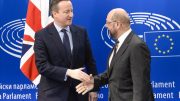Post-Brexit trade policy and whether or not the United Kingdom wants to remain in the European Customs Union, has not sparked the informed debate it deserves, writes Geoff Kitney.
If the world ever needed a perfect example to define the phrase “dialogue of the deaf” it surely has it now in the form of the Brexit debate.
As Britain rushes towards the deadline for deciding what it wants its place to be in the world after Brexit, the lack of agreement on even the most basic points of a workable post-Brexit model for the UK is both shocking and dangerous.
Nowhere is this more obviously the case than on the issue of post-Brexit trade policy.
Trade is the most critical Brexit issue. How Britain trades and whom it trades with after March next year are the issues that will decide what sort of nation Britain becomes in life after the European Union.
A threshold question is now at the centre of the Brexit debate – should Britain remain a member of the European Customs Union post-Brexit?
The answer to this question will determine whether Britain steps out from the trading system which has been the cornerstone of its economic success for half a century and ventures out on its own into the harsh world of global trade politics.
But, faced with such a momentous choice, British voters are being offered the most meagre and inadequate information from which to make a judgement about what is best for them and for subsequent generations.
The polarised debate – with bitterly intransigent actors on both extremes doing little more than insisting that they are right and everyone should accept that they are right – is resulting in the British public marching towards an utterly unknown future.
The argument is barely more sophisticated than this – Brexiteers say that Britain, freed from the dead hand of the EU, will become a global trade superpower while Remainers say that Brexit is based on a lie which leaves it lost in the world trading system and on the way to impoverishment.
To an outsider, this appears little short of madness.
Faced with such a momentous choice, British voters are being offered the most meagre and inadequate information from which to make a judgement about what is best for them and for subsequent generations.
As an avid reader of as much of the Brexit debate as I can get my hands on, it seems that the debate is utterly hollowed out, to an extent that a conscientious British citizen trying to make a judgement about what is likely to be the best course for their country to take, has absolutely zero chance of being able to find the answers to their questions.
On the most fundamental of questions – how and with whom will the UK replace the EU single market – the lack of anything that could reasonably be called “empirical evidence” is stunningly negligent.
A case in point was an article published late last month in The Financial Times. Written by the Conservative MP for Berwick-upon-Tweed, Anne-Marie Trevelyan, it argued that Britain had no choice but to go all the way and quit the EU, the Single Market and the Customs Union to free itself to establish an entirely new external trading framework with partners of its own choosing.
She argued that for Britain to stay in the Customs Union and, consequently, continue to accept the EU’s tariff levels, it would leave Britain unable to negotiate its own trade agreements “with old friends like America, India and Australia”.
Trevelyan argued that the key to Brexit Britain’s trading future would be the capacity it would have to negotiate trade agreements with those “old friend” countries and with developing countries in which the UK could offer to remove its own tariff barriers in return for these countries removing their tariff barriers to allow imports of goods produced by the UK.
But this argument fundamentally misunderstands the key principles of trade policy.
In fact, if what Brexit offers Britain is a future which relies on dirty deals between Britain and potential trading partners to trade little bits and pieces of market access in return for little pieces of extra trade, Britain is headed for a very grim future.
It would be a future in which it will have contributed to the slide of the global economy into an ugly “beggar-thy-neighbour” trading system.
If what Brexit offers Britain is a future which relies on dirty deals between Britain and potential trading partners to trade little bits and pieces of market access in return for little pieces of extra trade, Britain is headed for a very grim future.
If you find that hard to get your head round, a just-published, highly credible analysis by the Australian Productivity Commission on trade policy and the principles of open trade and competitive advantage makes compelling reading.
In a regular review it publishes of developments in trade policy, the Commission rings a loud alarm bell about recent developments in the global trading system.
It says the shift by the United States under President Donald Trump from a driver of the global, liberal trading order to a protectionist nation is deeply concerning and risks forcing global trade to decline for the first time in the modern era.
While much of the report focuses on what this could potentially mean for Australia, it also includes detailed analysis of what it argues offer the best chances for any one nation of gaining the greatest advantage from the global trading system, even in an era of rising protectionism.
And its conclusions raise serious questions about what would be the best course of action for Brexit Britain.
What it makes clear is that the idea of Brexit Britain heading out in the world in search of new trading partners to replace the EU and seeking to trade off its tariff levels in return for market access to other markets through bilateral free trade agreements – as suggested by Trevelyan and others, including the UK Trade Minister Liam Fox – offers the worse possible outcomes for the UK, not the best.
The Commission says that bilateral free trade agreements are little better than protectionism itself.
It says countries which attempt to use bilateral trade agreements as ways of gaining market access (which President Trump says is his preferred means of protecting America’s interests) run the risk of creating what it calls “noodle bowl” agreements.
By this it means lots of different agreements with different partners, each with their own detailed conditions which create complexity for businesses and compliance costs before they can access trade preferences. The Commission said Australian experience had shown that Australian companies found it easier to pay the general tariff rate than to comply with these “legalistic requirements”.
How Britain trades and whom it trades with after March next year are the issues that will decide what sort of nation Britain becomes in life after the European Union.
The Commission argued that if trade agreements were preferred to unilateral tariff reductions, it would be far preferable for them to be pluralistic agreements and, better still, “mega-regional” agreements. In case no-one has noticed, that is what Britain has now – access to the world’s largest “mega-regional” trade group – the European Union and the Single Market.
By the way, the Commission also says that by far the best approach of all for a nation that wants to get the greatest advantage in the global trading system is through unilateral trade liberalisation.
It says the long-term gains for businesses and consumers are always greatest through reducing barriers to trade without trying to use this as a lever to get access to the markets of other nations.
Is that what Brexiteers really have in mind?
It would be a brave Brexiter who argued the case.
But their apparent preference for preferential, bilateral trade agreements – while it might sound more politically palatable – is almost certainly going to turn out to result in Britain losing what might be the potential economic gains that are offered by Brexit and the chance they claim that it will offer Britain to become “a great trading nation” outside the EU.





